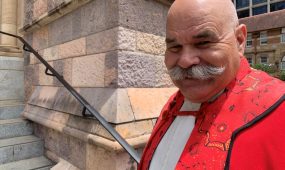To the Red Sea and back again: representing Indigenous Anglicans at COP27
Justice & Advocacy
“As I looked out beneath the palm trees on a sandy Egyptian beach towards the calm, clear waters of the Red Sea recently, I thought of my stunning island home…Because my people’s spirituality lies in the sea, sky and land – which are all part of God’s good creation – we have an intrinsic connection to them,” says Aunty Dr Rose Elu
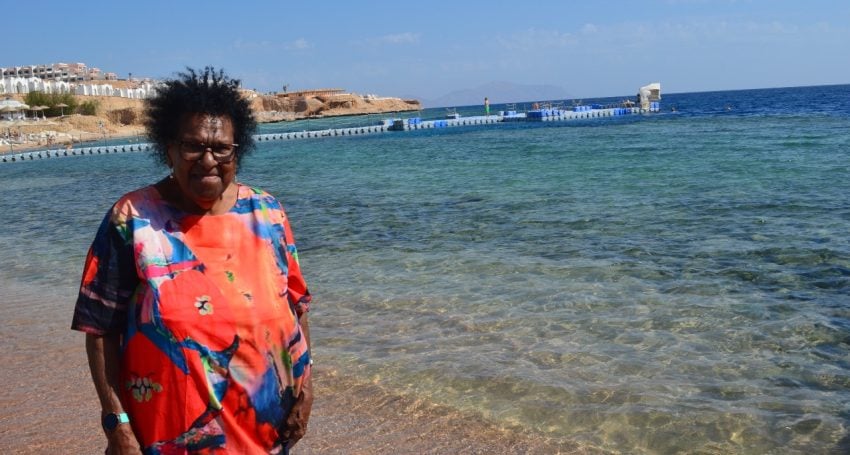
As I looked out beneath the palm trees on a sandy Egyptian beach towards the calm, clear waters of the Red Sea recently, I thought of my stunning island home. My people are from the beautiful island of Saibai in the Torres Strait Islands.
Because my people’s spirituality lies in the sea, sky and land – which are all part of God’s good creation – we have an intrinsic connection to them. We see ourselves as part of and belonging to creation. God’s creation is, therefore, fundamental to our entire wellbeing.
I was in Egypt recently because the Anglican Indigenous Network nominated me to join other Anglican Communion delegates at the United Nations Climate Change Conference, or COP27.
Others in the Anglican Communion delegation included:
- Archbishop Julio Murray, the Bishop of Panama, Primate of the Anglican Church in Central America, and chair of the Anglican Communion’s Environmental Network.
- Amal Sarah, from Pakistan, who heads the Anglican Communion Youth Network’s Advocacy Mission team.
- Archbishop Samy Fawzi Shehata, Bishop of the Diocese of Egypt and the Archbishop of the Anglican/Episcopal Province of Alexandria, which was the host Church of the Anglican Communion for COP27.
Alongside the delegation was Joel Kelling, the Anglican Alliance’s Middle East facilitator, as well as others who joined in remotely.
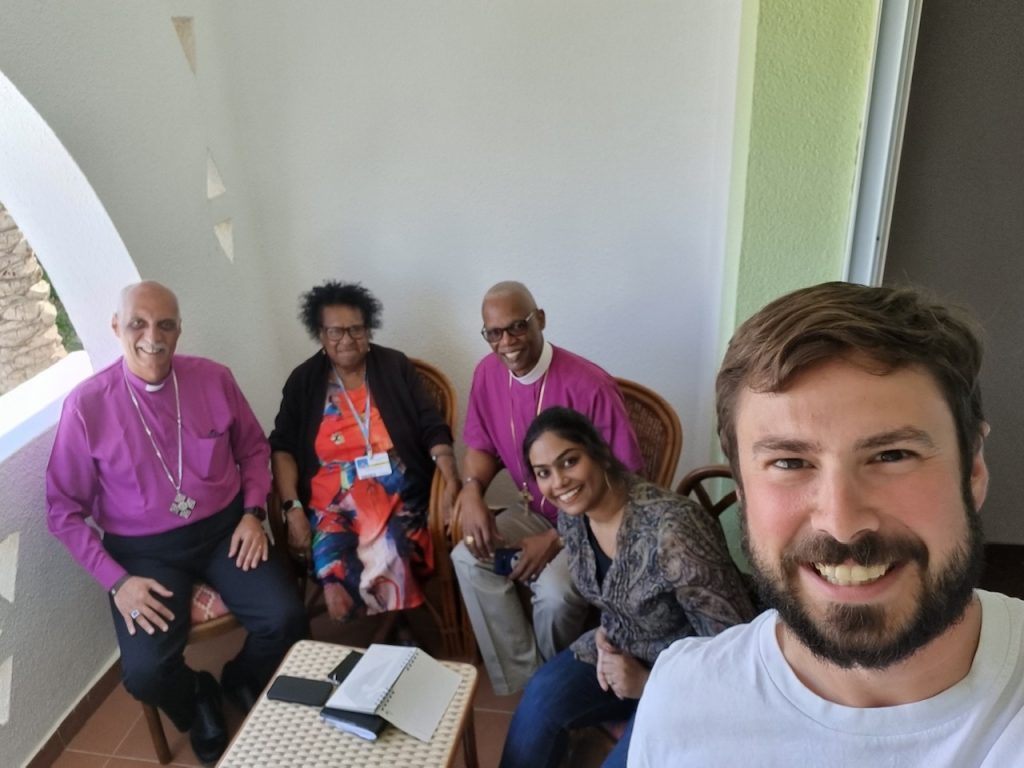
The Anglican Communion’s COP27 delegation included Aunty Dr Rose Elu (who represented the Anglican Indigenous Network), Archbishop Samy Fawzi Shehata, Archbishop Julio Murray and Amal Sarah, who were joined by Joel Kelling
The Anglican Indigenous Network (AIN) traces its beginnings to the 1991 General Convention of the Episcopal Church in Phoenix, Arizona. The network comprises Anglican ministry groups from Australia; New Zealand, Aotearoa and Polynesia; Canada; Hawaii; and, the wider United States. We are committed to the Anglican tradition, while affirming our traditional spiritualities and acknowledging that we have common concerns, gifts and hopes.
We believe that God is leading the Church to a turning point in its history and that the full partnership of Indigenous peoples is essential if we are to leave a lasting legacy for all of our children and grandchildren. This “turning point” includes how we address damage to the climate. Indigenous peoples know how to care for the land, sea and sky – we have been doing so for millennia.
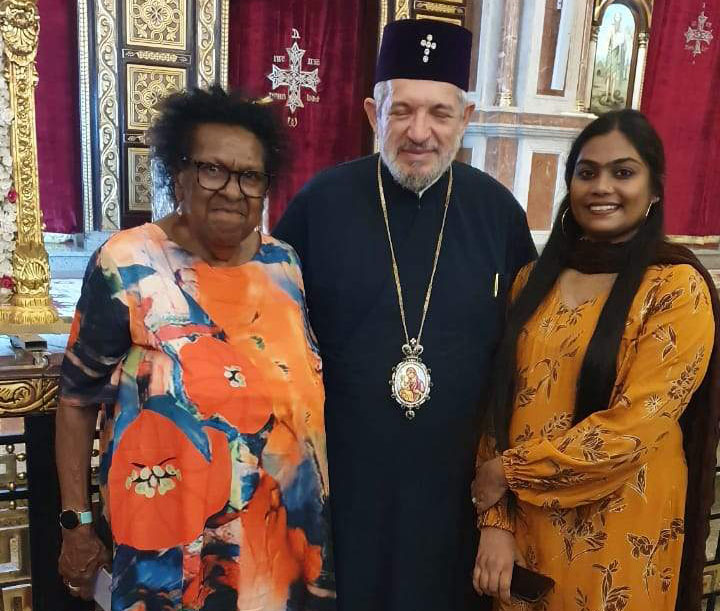
While in Egypt for COP27, Aunty Dr Rose Elu and fellow Anglican Communion delegates met with ecumenical leaders, including Coptic clergy
COP27, or the 27th session of the Conference of the Parties, was held last month at Sharm EL Sheikh, an Egyptian city on the southern tip of the Sinai Peninsula. The event was huge. From 6 to 20 November, COP27 held high-level and side events, significant negotiations and major media conferences. The event hosted more than 90 Heads of State, over 35,000 participants from 190 countries and many pavilions showcasing global climate action across different sectors.
Advertisement
I attended numerous forums at the event, including those of African nations, Tuvalu, Kiribati, Pakistan and Myanmar. The stories I heard in these forums strongly resonated with mine and those of fellow Torres Strait Islanders.
I spoke at a roundtable discussion with other Aboriginal and Torres Strait Islander delegates and the Assistant Minister for Climate Change and Energy, Senator the Hon Jenny McAllister. I was also interviewed by the UK media. In these conversations, I shared about the devastating impacts of rising sea levels on the low-lying Torres Strait Islands.
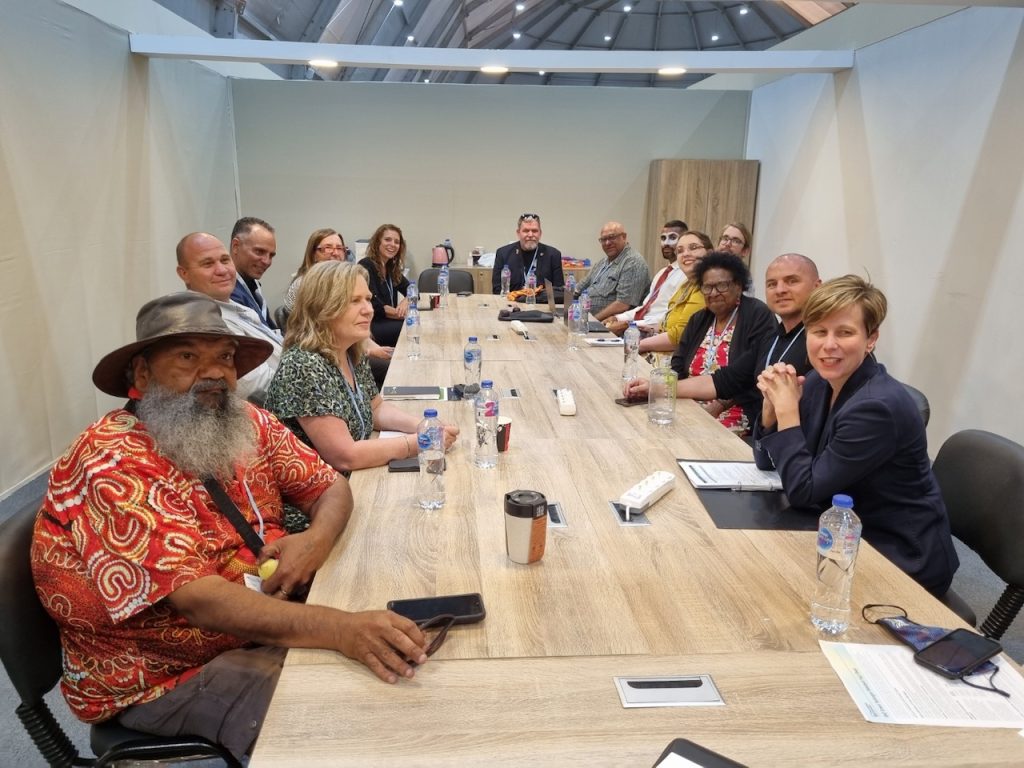
“I spoke at a roundtable discussion with other Aboriginal and Torres Strait Islander delegates and the Assistant Minister for Climate Change and Energy, Senator the Hon Jenny McAllister” (Aunty Dr Rose Elu, COP27)
I explained that there are 17 inhabited islands in the Torres Strait and seven of these are inundated with water due to rising sea levels. My island of Saibai is one of these. Because of damage to the climate, we are finding it increasingly difficult to obtain clean fresh drinking water, materials for shelter, and livable land.
I shared about how coastline erosion is destroying gardens of traditional cultural foods that we need for physical nourishment, celebrations and ceremonies, such as taro, yams, cassava and sweet potato. I also explained that our ceremonial and burial sites are being destroyed by rising sea levels. Our livelihoods are also being significantly affected, which is very distressing for my people.
Ms McAllister listened to what we had to say and said she would table our concerns in Federal Parliament. We appreciated her willingness to listen and take action.
Other Torres Strait Islanders from many different islands also attended COP27. I hope that their voices were heard. Indigenous peoples are currently among the hardest hit by damage to the climate.
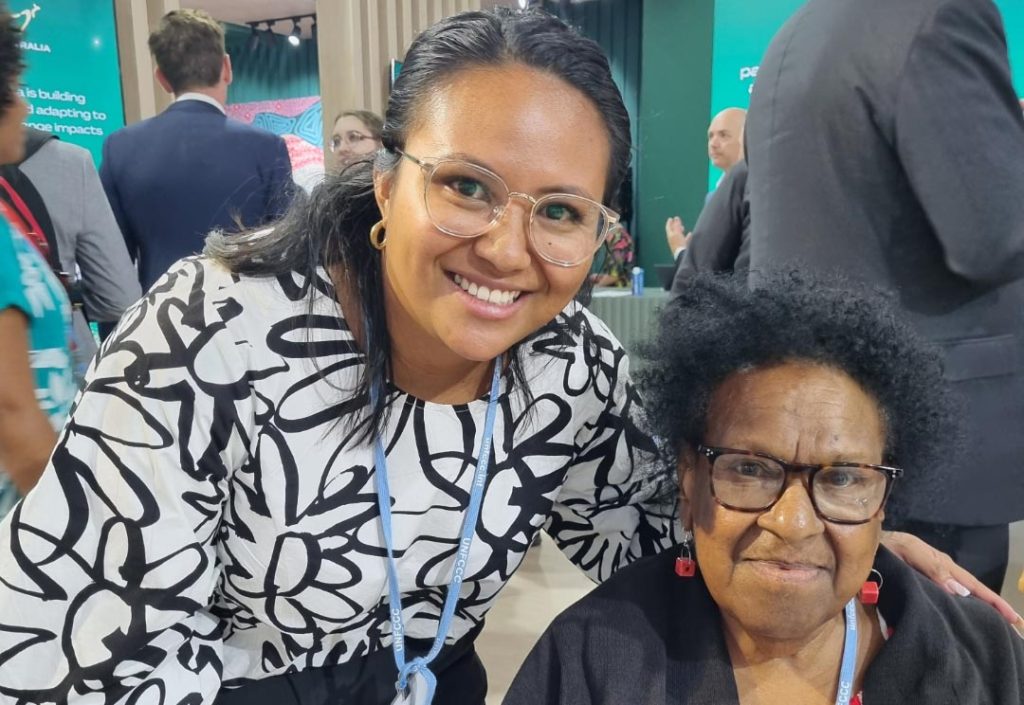
While in Egypt for COP27, Aunty Dr Rose Elu met up with fellow Torres Strait Islander woman Sanchia Tamwoy, who is Second Secretary Cairo Post for the Department of Foreign Affairs and Trade
As Christians, we believe that “The earth is the Lord’s and all that is in it, the world, and those who live in it (Psalm 24.1).” By respecting God’s good creation and being thankful for it, we respect God and show gratitude towards the Creator.
In my experience, the Church understands that Indigenous peoples know how to care for God’s creation and wants to see the climate re-balanced. This is a key reason why the Church is very active when it comes to this globally significant matter.
Christians want to help others – it’s what we do. Churches are important agents of change because Churches care about the whole person, including their physical, spiritual, emotional, social and cultural wellbeing. I must say that Anglicans are advocating and lobbying well for Indigenous peoples affected by rising sea levels and other climate-related impacts.
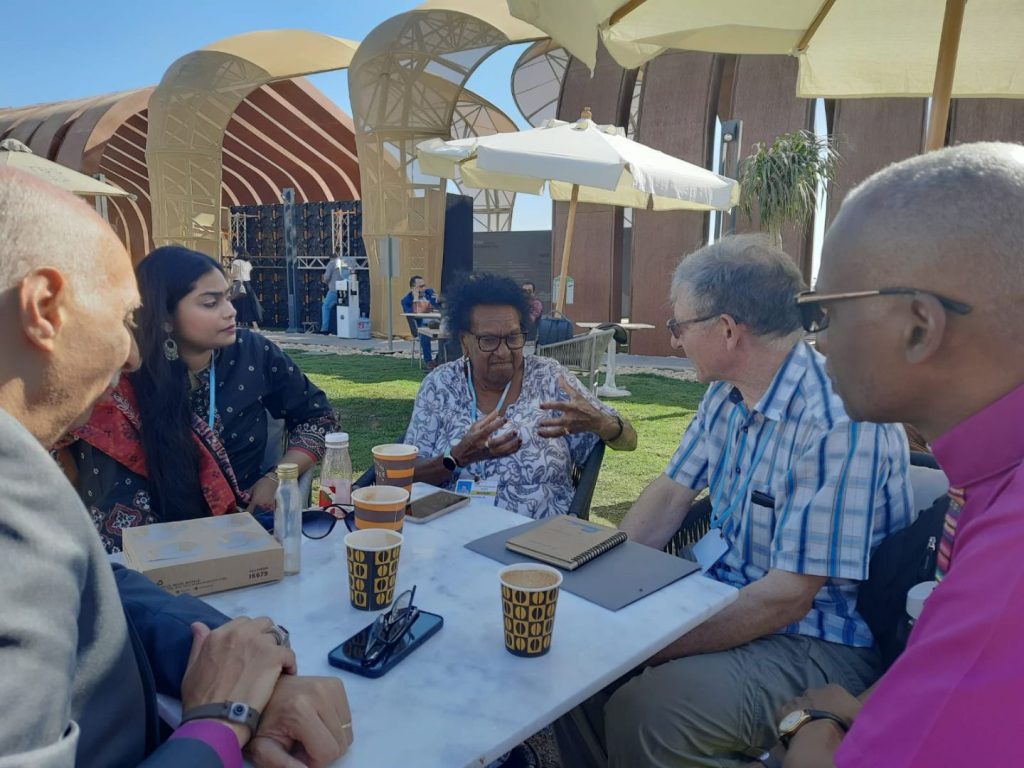
The Anglican Communion’s COP27 delegation, Aunty Dr Rose Elu, Archbishop Samy Fawzi Shehata, Archbishop Julio Murray and Amal Sarah, discussing the climate with an Australian environmentalist
This was my second United Nations Climate Change Conference. I attended the COP21 event in Paris in 2015. There have been many positive developments since the 2015 Paris Agreement, which was implemented in 2016. Australia is party to the Paris Agreement, which aims to limit global warming to (well) below 2 degrees Celsius above pre-industrial levels. To achieve this, we all need to work constructively together to sufficiently reverse damage to the climate by mid-century.
Advertisement
In order to rebalance the climate, we must invest in more clean energy. Australia continues to lead the world in the per capita rollout of energy generated by solar and wind. As “the Sunshine State”, Queensland has a particular abundance of sun for solar energy – we are truly blessed by this advantage.
Renewable energies, such as solar and wind, are also good for our back pocket, our health (by lessening pollution) and future jobs. If we all work together, we can create safe, healthy, habitable and sustainable communities – both on the main land and on our islands.
Here are four things you can do to help:
- Email Senator the Hon Jenny McAllister or call her Parliament House office on (02) 9719 8100, thanking her for listening to Aboriginal and Torres Strait Islanders in a roundtable COP27 discussion and for being willing to table our concerns in Parliament.
- Contact your own Member of Parliament and ask them to help protect Torres Strait Islander peoples’ livelihoods, homes and cultures, which are being severely impacted by rising sea levels, by asking them to support stronger renewable energy policies.
- Do what you can in your own homes to help rebalance the climate, including by investing in solar energy, consuming and wasting less, and recycling more.
- Listen to the stories of First Nations peoples – who know how to care for the land, sea and sky – and work with us to rebalance the climate.




